THE DODGERS’ JOURNEY TO BACK-TO-BACK WORLD SERIES TITLES
DYNASTY
WORLD SERIES EXTRA
YAMA-MOJO!
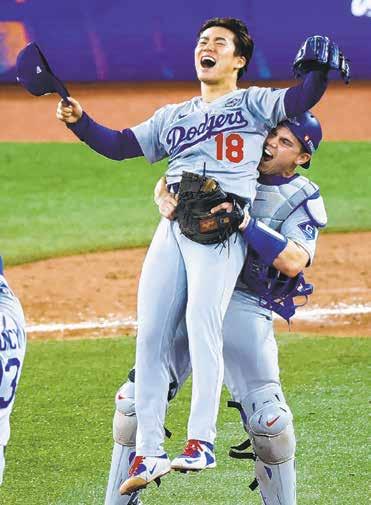
CREDITS
Los Angeles Times
EXECUTIVE CHAIRMAN
Dr. Patrick Soon-Shiong
EXECUTIVE EDITOR
Terry Tang
MANAGING EDITOR
Hector Becerra
EDITOR AT LARGE
Scott Kraft
ASSISTANT MANAGING EDITOR, SPORTS
Iliana Limón Romero
DEPUTY SPORTS EDITOR
Ed Guzman
SENIOR SPORTS EDITOR
Austin Knoblauch
By Jack Harris
ASSISTANT SPORTS EDITOR
Houston Mitchell
EXECUTIVE DIRECTOR OF PHOTOGRAPHY
Kim Chapin
PHOTO EDITOR
Tracy Gitnick
DYNASTY EDITOR
John Cherwa
EXECUTIVE VICE PRESIDENT OF BUSINESS DEVELOPMENT AND COMMERCE
Lee Fentress
DIRECTOR OF COMMERCE
Samantha Smith
FRONT COVER: Let the celebration begin. Let the dynasty talk commence. The Dodgers are World Champions for the second year in a row. There were plenty of heroes, many of them surrounding World Series Most Valuable Player Yoshinobu Yamamoto, who was 5-1 in the postseason including two complete games and a relief appearance that got him a win in Game 7. GINA FERAZZI / LOS ANGELES TIMES
BACK COVER: Clayton Kershaw only played in one game in the World Series, but that doesn’t mean he can’t be part of the postgame celebration. Eighteen years of outstanding service earns you that right.
ROBERT GAUTHIER / LOS ANGELES TIMES
Copyright © 2025 by the Los Angeles Times
All Rights Reserved • ISBN: 978-1-63846-185-2
No part of this book may be reproduced, stored in a retrieval system or transmitted in any form or by any means, electronic, mechanical, photocopying, recording or otherwise, without prior written permission of the copyright owner or the publisher.
Published by Pediment Publishing, a division of The Pediment Group, Inc. • www.pediment.com
Printed in Canada.
This book is an unofficial account of the Los Angeles Dodgers’ 2025 season by the Los Angeles Times, and is not endorsed by Major League Baseball or the Los Angeles Dodgers.
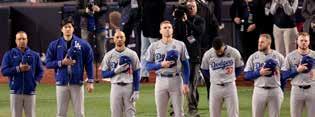

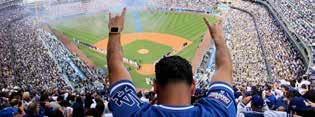

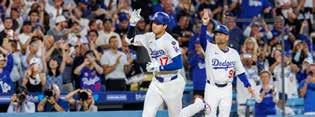
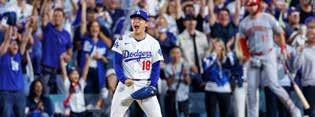
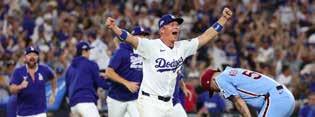
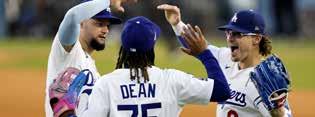
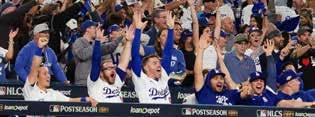
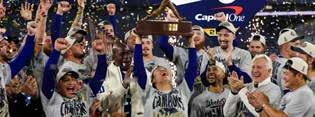
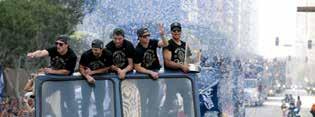
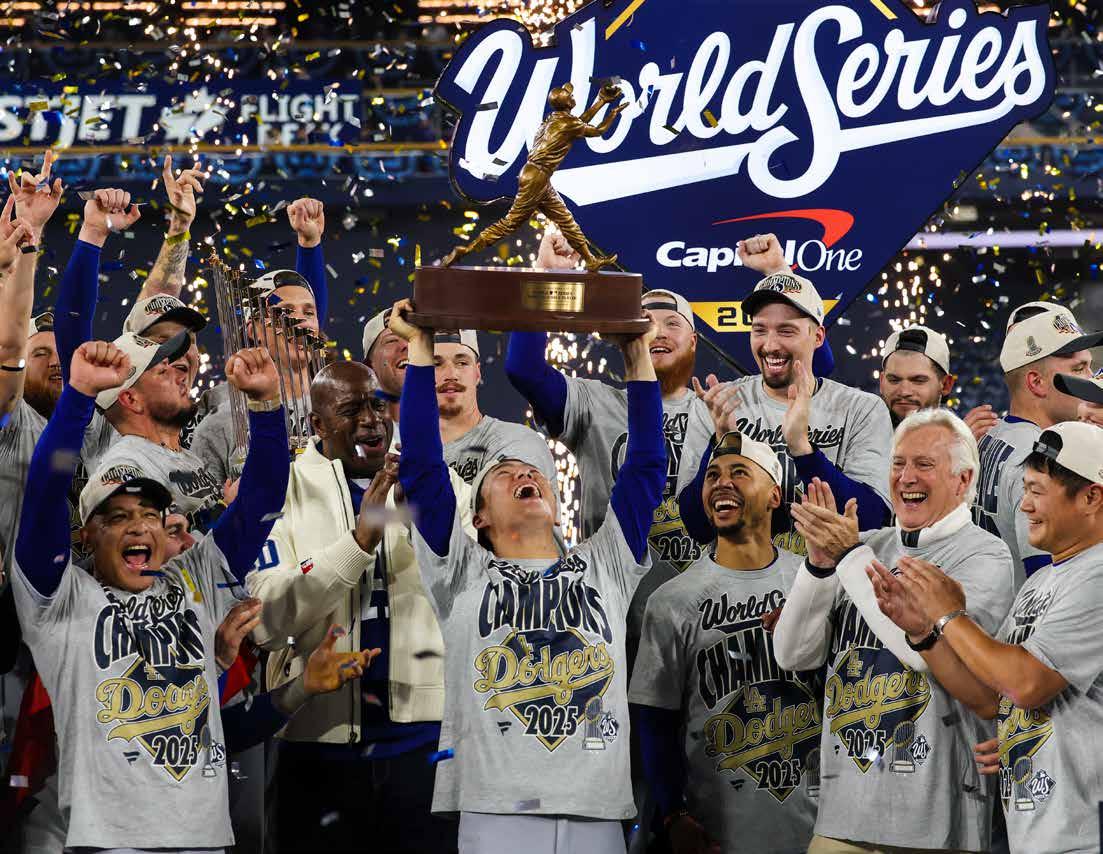
Back to back! They can officially be called the Dynasty Dodgers
BY BILL PLASCHKE • NOV. 1, 2025
The Dynasty Dodgers.
Shout it as loud as a Will Smith home run, ball soaring, arms flailing, blue immortality awaiting.
Shout it as deep as a Miguel Rojas home run, impossible, unimaginable, shaking all of Los Angeles, forever.
Shout it long enough to line a parade. The Dynasty Dodgers.
Two measly outs from a World Series Game 7 defeat, the Dodgers roared back in the final breaths of baseball’s ultimate game Saturday to pull off an ultimate victory, overtaking the gritty Toronto Blue Jays at the Rogers Centre to steal a 5-4, 11-inning win for their second consecutive World Series championship.
In becoming the first team in 25 years to win consecutive championships, in winning their third title in six seasons, the Dodgers are now certifiably a dynasty.
And Rojas and Smith are certifiably Dodgers icons after Rojas’ home run tied the score in the ninth and Smith’s home run gave them the lead and decided the game in the 11th.
“We’ve put together something pretty special, I do know that,” said Manager Dave Roberts after leading their fifth champagne party this fall. “To do what we’ve done in this
span of time is pretty remarkable. I guess let the pundits and all the fans talk about if it’s a dynasty or not, but I’m pretty happy with where we’re at.”
The classic ended with an Alejandro Kirk double play grounder in the bottom of 11th induced by a third icon, Series MVP Yoshinobu Yamamoto, who finished with 2 ⅔ scoreless innings despite throwing 96 pitches 24 hours earlier.
The Dodgers raced to the center of the diamond where they bounced and danced in a group hug that became a massive dogpile of both exultation and relief.
It was a fitting celebration for an ending that was so wild, at one point Roberts simply tugged his cap down toward his eyes and shaking his head in disbelief.
“There were so many pressure points and how that game could have flipped, and we just kept fighting, and guys stepped up big,” said Roberts. “So I could just go on and on about the big plays, the big performances, and it’s one of the greatest games I’ve ever been a part of.”
With one out in the ninth, trailing 4-3, Rojas, who entered the game without a hit in a month, hit a full-count slider from Jeff Hoffman over the left-field fence for only his second home run since August.
“We were going to play 27 outs,” said Roberts. “Obviously, it doesn’t look great in that moment, but I trust him to take the at-bat, and he got a pitch that he could handle and hit the biggest hit he’s ever had in his life.”
Then, in the bottom of the ninth of a 4-all tie, with the Blue Jays having loaded the bases with one out, Rojas created greatness again by making a great stop of a Daulton Varsho grounder and throwing out Isiah KinerFalefa at the plate.
As if that wasn’t dramatic enough, Andy Pages added to that greatness by leaping over Kiké Hernández in left field to catch an Ernie Clement fly ball to end the inning.
Two innings later, Smith hit a Shane Bieber hanging slider 366 feet over the leftfield fence for their first lead of the night, and one just knew the Dodgers weren’t going to give it away.
“I’m having a hard time unpacking it, just what a great series, what a great game, and I think we’re going to be talking about this game for a long time,” said Roberts.
It was an appropriately resilient threeinning finish that capped an ultimately inspirational eight-month marathon.
A season that began in Japan in March ended in Canada on Saturday night with the
OPPOSITE: This is why you play 162 regular season games and 17 postseason games to be able to hoist two trophies and celebrate with your teammates and executives. The World Series trophy can be found behind Magic Johnson as Yoshinobu Yamamoto lifts the World Series Most Valuable Player trophy. It’s the second straight year the Dodgers have won the World Series. The last team to win back-to-back was the New York Yankees, who won it three times from 1998 to 2000. ROBERT GAUTHIER / LOS ANGELES TIMES
Being a dynasty means you have to win more than once and that’s what the Dodgers have done. This moment was from last year’s World Series as the Dodgers stand at attention for the national anthem before Game 3 against the New York
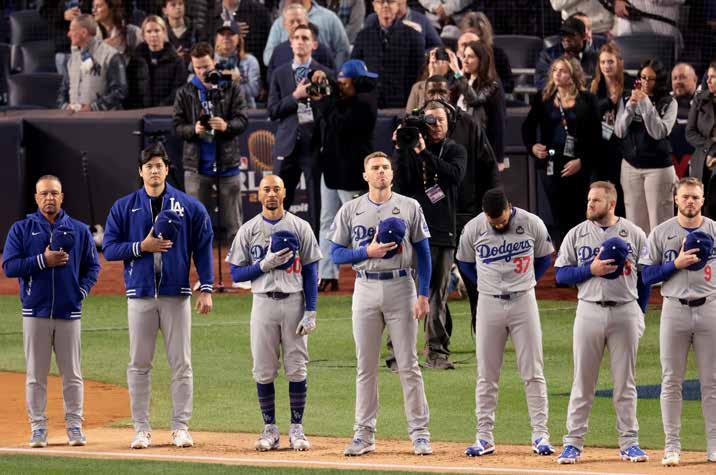
Dodgers conquering all worlds in between.
There was arguably more pressure on this team than any other collection of players in major league history, and, yet, somehow, the Dodgers thrived.
In the end, the team that couldn’t lose didn’t lose. The invincible Hall of Fame lineup proved unbeatable. The richest team in baseball history was pure money.
The team that everyone outside of Los Angeles booed ended up with cheers that will echo through the ages.
Goliath won. Sorry about that, Davids.
While celebrating the sweep of the Milwaukee Brewers in the NLCS, Dave Roberts famously shouted to the Dodger Stadium crowd, “Before the season they said the Dodgers are ruining baseball. Let’s get four more wins and really ruin baseball!”
In showing their mettle time and again in this classic seven-game series, the Dodgers didn’t ruin baseball, they revived it.
It was first and foremost a victory for the Mark Walter-led Guggenheim Baseball
Management. With this victory they become unquestionably the best owners in baseball and soon, with Walter’s purchase of the Lakers complete, they could soon be the best owners in all of sports.
They make a ton of money, but they pour it back into the team at a pace unmatched by their baseball peers. Ticket prices go up, but some of that money goes right to Freddie Freeman. Parking prices are obscene, but so is the ability of Shohei Ohtani.
Not once in their 13-year tenure has
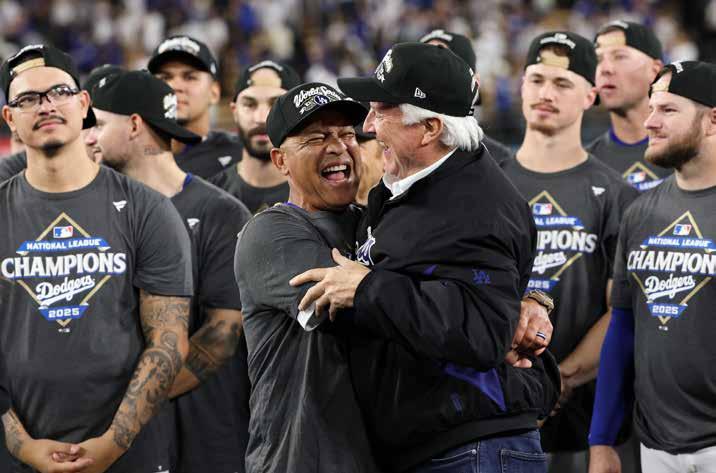
Guggenheim been accused of passing up talent to save money. In most other markets, that is an accusation made daily.
Second, this was a victory for the man in charge of spending all that money, baseball genius Andrew Friedman. Yes, he nearly blew it this year by wasting money on lousy relievers this winter and then not adding to the bullpen at the trade deadline. But it turns out his starting pitching would be enough, and it was, all four starters appearing in Game 7 at a cost of more than $1 billion.
Friedman has been right far more than he’s been wrong as the architect of most of the 13 years of greatness.
Third, the victory belongs to Roberts, the manager who, with this third title, has gone from hassled to the Hall of Fame. He is not only a worthy successor to the legend of Tommy Lasorda, he has won more than Lasorda while serving as the perfect face for the organization and a calming touchstone for its players.
Never a clubhouse controversy? That’s
Roberts. Never a battle between super egos on a team with several future Hall of Famers?
That’s Roberts. There was a time Roberts struggled with pitching changes, but he has seen matured and evolved and often now shares a heartbeat with the countless relievers he summons.
In the end, they not only ran it back, they sprinted it back, they slugged it back, and then, finally, they literally Will-ed it back.
The Dynasty Dodgers.
LEFT: Two of the architects of this Dodgers Dynasty embrace after winning the National League Championship Series. Manager Dave Roberts, left, was just the right personality to lead this team with his never-too-high, never-toolow approach that the players appreciated. Mark Walter, controlling owner of Guggenheim Baseball Management, spent money to allow the Dodgers to acquire the best lineup in baseball. Those guys know how to win a World Series.
ROBERT GAUTHIER / LOS ANGELES TIMES
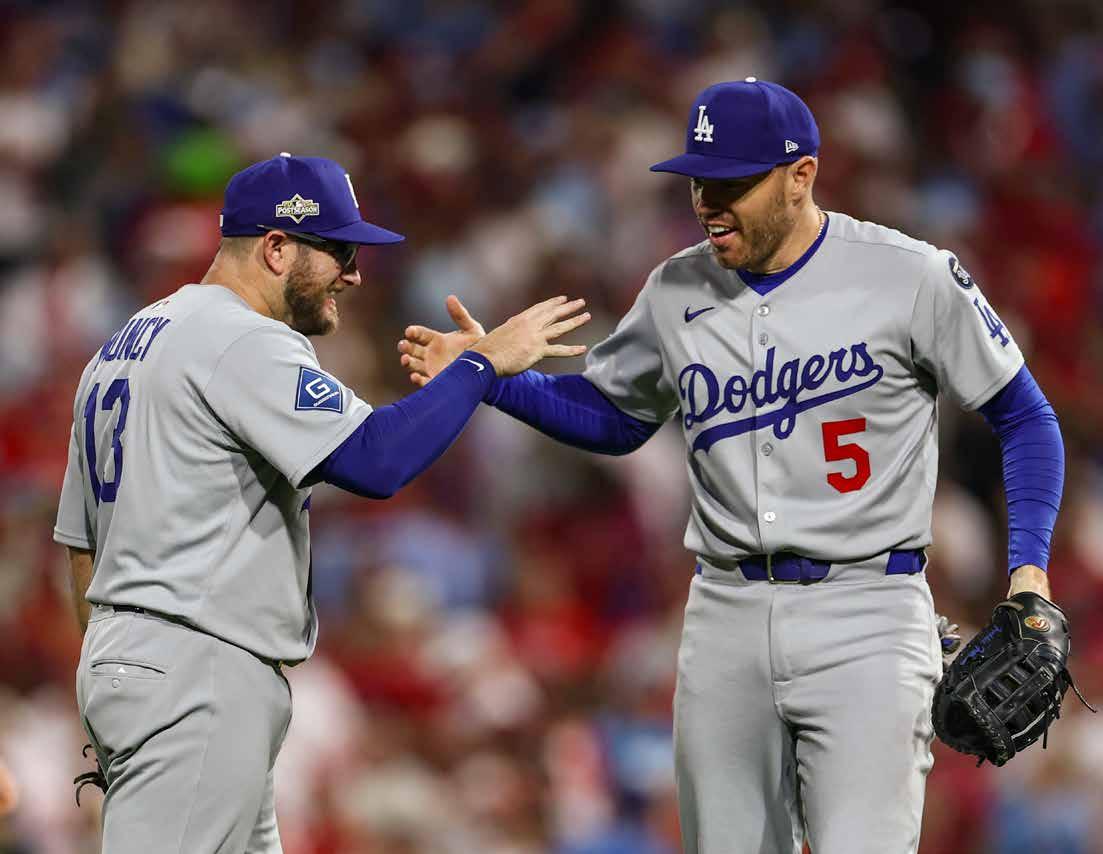
Money helps Dodgers win but culture was the key in Game 7
BY JACK HARRIS • NOV. 4, 2025
With confetti at his feet, a drink in his hand and a smile of equal parts relief and elation planted on his face, Dodgers third baseman Max Muncy gave the question of the night only a cursory thought.
Had the Dodgers cemented a dynasty?
“I guess so,” he said.
Over the last six seasons, Muncy had been one of six Dodgers players to have a hand in all three of their recent World Series championships. He had become one of the faces of a team that elevated itself to historic all-time heights.
But when the topic of the club’s legacy came up, as he stood on the field in the wake of the Dodgers’ Game 7 thrill ride in Toronto on Saturday night, the 35-yearold veteran’s mind was occupied by another thought. The pride he felt emanated from a different source.
“The thing that I’m most proud of is the culture that we have created,” he said. “I hope that’s what’s talked about the most.”
In the public discourse, of course, it won’t be.
These Dodgers, with their star-studded roster and record-setting $415 million payroll and long-established reputation as big-spending villains who might be ruining baseball, have only further fueled debates
about the financial inequities of the sport.
With a labor battle looming next year, they will be turned into a proxy — the prime example, critics will argue, of what’s wrong with the only major professional sports league in North America without a hard salary cap.
Some of those concerns will be justified (the Dodgers are spending at levels MLB has never before seen, and well beyond most of their competition). Others will be exaggerated (they are also spending within the league’s rules, and re-investing revenues back into their roster at a higher percentage than almost all other franchises).
The players themselves, however, really couldn’t care less.
Money, after all, might have given them the talent to win back-to-back World Series. But it took something else to help them get to, and especially conquer, the mental and physical test they faced in Saturday’s Game 7.
“When you come to the Dodgers, and you put on that Dodgers uniform, it’s all about, ‘How do you do what you need to do to win the game? How do you help the team win the game?’” Muncy said, his hoarse voice beginning to crack. “I seriously can’t put into words how much it means to me that we’ve created something that’s that special.
that everyone knows about now.”
Culture and camaraderie might be clichéd traits easy to point to in the wake of any World Series championship, but they were nonetheless present in the Dodgers’ quest to repeat this year.
Take the first big turning point of this postseason: The iconic “wheel play” the Dodgers ran to defend a bunt in the ninth inning of Game 2 of the National League Division Series.
That maneuver was suggested and executed by Mookie Betts — a player the Dodgers signed for $365 million five years ago to be a Gold Glove right fielder, but who moved to shortstop out of roster necessity on a fulltime basis this season and transformed into a Gold Glove finalist.
Dollars might be the reason Betts now plays in Los Angeles. But it was his tireless daily routine of taking infield grounders, and his ability to learn from and overcome early-season growing pains, that made that moment possible.
“For him to play that caliber of shortstop, I think, is underappreciated,” president of baseball operations Andrew Friedman said. “I don’t think people are paying enough attention to how difficult that was.”
Clinching the NLDS required
OPPOSITE: Max Muncy and Freddie Freeman celebrate after the Dodgers beat the Philadelphia Phillies in Game 2 of the National League Division Series. It was a nailbiter as the Dodgers’ 4-1 lead was 4-3 before the final out was recorded when Roki Sasaki got Trea Turner to ground out to second. It gave the Dodgers a two games to none lead as the series headed to Dodger Stadium.
ROBERT GAUTHIER / LOS ANGELES TIMES
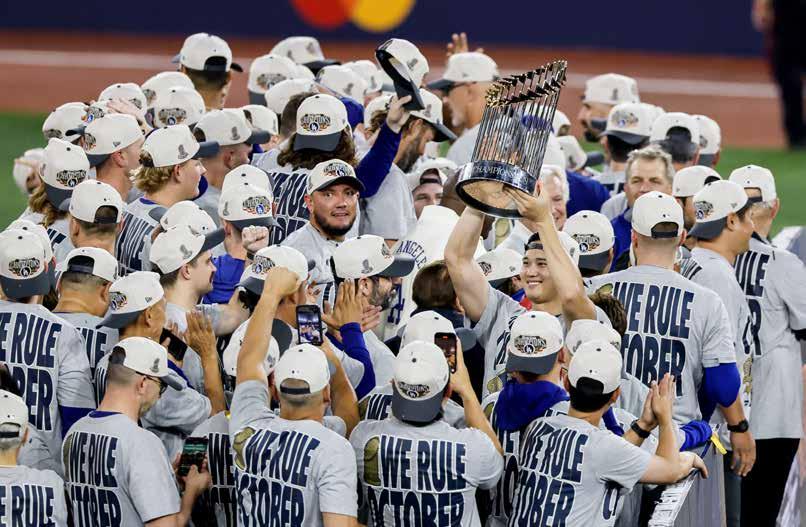
contributions from another star talent serving in an unexpected new role.
When rookie Japanese phenom Roki Sasaki signed with the Dodgers this offseason, it enflamed the external worries about their hoarding of talent. Sasaki, however, struggled as a starter, missed most of the year with a shoulder injury, then faced a decision ahead of the playoffs about whether or not to move to the bullpen.
He accepted, despite having never been a reliever in his professional career before. And in the playoffs, he fulfilled the team’s gaping hole at closer, highlighted by the three perfect innings he pitched in their NLDS-clinching Game 4 win.
“For Roki to come through in that spot after the year he’s had,” Muncy said at the time, “that was just so huge for us.”
The NL Championship Series was the
one time the Dodgers clearly outclassed a playoff opponent, rolling past the overmatched Milwaukee Brewers behind historic starting pitching performances from Blake Snell (a $182 million signing last offseason), Yoshinobu Yamamoto (a $365 million signing the winter before) and Tyler Glasnow (a $136.5 million acquisition), then an all-time two-way showing in Game 4 from Shohei Ohtani (the $700 million man who has been at the center of the consternation over the Dodgers’ spending).
The World Series, however, brought an unexpectedly stiff challenge from the Toronto Blue Jays — who were heavy underdogs to the Dodgers despite their own top-five payroll of $278 million. In the Fall Classic, the Dodgers’ sheen of invincibility was shattered. Their lineup struggled. Only Yamamoto maintained his previous level of dominance in the rotation. A long-suspect bullpen finally faltered. And in many facets of the series (in which the Blue Jays outscored the Dodgers 34-26 and hit .269 to the Dodgers’ .203 team average), the Dodgers looked second-best.
“I mean, big picture-wise, we didn’t play very well,” Friedman said. “But those big pivotal moments is where our guys really showed up … Which I think gets at who they are, the compete, how much they care about each other, how much they care about bringing a championship back to LA in back-to-back years.”
There was Game 3, when the Dodgers prevailed in an 18-inning marathon by getting an unforeseen boost from little-known reliever Will Klein, who was willing to sacrifice his arm in a grueling four-inning outing despite spending most of this year stuck in the minors.
There was Game 6, when the team survived a potential season-ending, ninthinning jam thanks to the veteran defensive instinct Kiké Hernández (the high-energy October stalwart who started every game of the playoffs after limited playing time in the regular season) and Miguel Rojas (who has become one of the emotional leaders of the team since being acquired in a 2023 trade for a minor-league prospect, despite also serving in a depth role for most of the summer) flashed on a victory-sealing double play.
“That’s what makes us really tough,” Rojas said. “[We’re] competing every single day, and regardless of what the situation is, I think everybody [is able to] just kind of forget about the past and focus on the moment right now.”
Game 7 provided the ultimate test.
The Dodgers trailed early, with Rogers Centre shaking after Bo Bichette’s thirdinning three-run homer. They couldn’t lean on Ohtani, who looked gassed while starting the game as a pitcher on short rest. They had to claw their way back instead, playing from behind all the way into the ninth inning — when their season was two outs away from ending in failure.
“We just kept going and going and going,” Muncy said. “I’m just really proud of all the guys for not giving up hope.”
It would’ve been easy to do so. After two exhausting years — full of deep postseason runs and season-opening international trips
and the daily pressure that came with their heavy offseason expenditures — the club’s tank appeared to be teetering on empty. Sheer talent, after all, can only sustain for so long.
“It’s been a long journey for the team, for the organization, for every player out here,” Rojas said before Game 6. “It’s been really stressful and everybody’s mentally tired.”
But this, Muncy declared, is where the Dodgers’ culture kicked in.
“It’s all about the team. It doesn’t matter about yourself,” he said. “When you’re coming in off the field and you have a whole group of guys in [the dugout] saying, ‘Hey, great inning. Let’s scrap something together. Let’s get a guy on base. Let’s get a run in,’ that kind of means everything.”
In the end, the Dodgers conjured their most heroic moments for when they needed them most.
With one out in the ninth, it was none other than Rojas — who was uncertain to even play in Game 7 after aggravating an intercostal injury the night before — who tied the score with a miraculous home run swing.
“When you play the game right, treat people right, are the teammate like Miguel is, I think we said it in there, the game honors you,” first baseman Freddie Freeman said. “Just doing whatever he could to help this team win.”
From there, the Dodgers (turning to their fourth traditional starter out of the bullpen on the night) summoned Yamamoto, who did something no record-breaking contract could have ever predicted by throwing 2 ⅔ scoreless innings on zero days’ rest after his 96-pitch start in Game 6.
“Can’t evaluate that,” Friedman said.
“That’s going to go down in history as one of the best championship performances in any sport,” pitching coach Mark Prior added.
Will Smith, one of the few homegrown talents on a team of hired guns, delivered the winning swing with his home run in the 11th.
“To me, he kind of epitomizes a lot of the success that we’ve had looking back,” Friedman said. “In terms of our scouting process, our player development process, how well they work together, and then him
“
‘That’s going to go down in history as one of the best championship performances in any sport.’
MARK PRIOR
coming through and having the impact he’s had at the Major League level.”
And fittingly, it was Betts who recorded the championship-clinching outs on a double-play chopper hit to him at short.
“A perfect bow on what was an incredible season for what he did at shortstop this year,” Friedman said.
All of it, Muncy proudly noted, exemplified what the Dodgers maintain was the ethos of their team; the kind of intangibles that won’t show up on a balance sheet or payroll list, even with all the money they’ve spent.
“That’s what we’ve created here,” Muncy said. “And that’s what I’m most proud of.”
“We kept going, and we persevered,” manager Dave Roberts echoed. “And we’re the last team standing.”
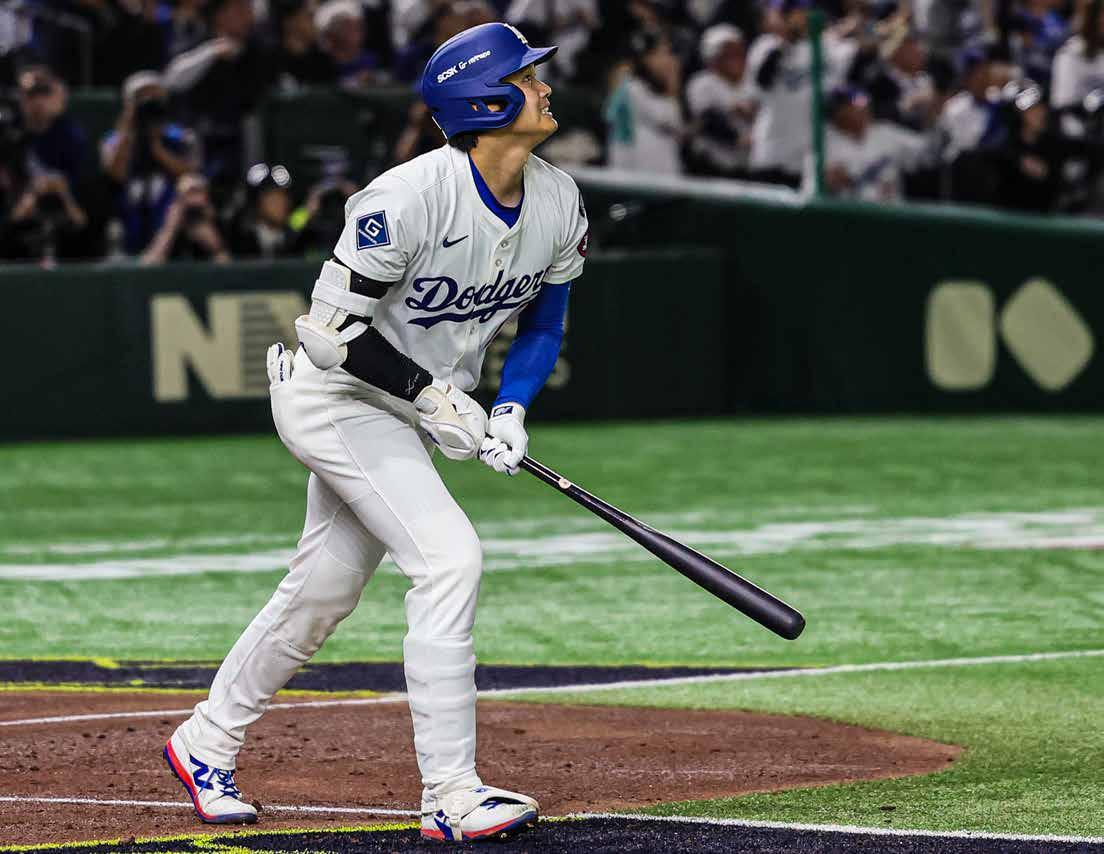
Ohtani’s Tokyo Series home run culmination of ‘Week of Ohtani’
BY DYLAN HERNÁNDEZ • MARCH 19, 2025
TOKYO — The entire week was a buildup to this.
Whether the ball struck by Shohei Ohtani would have cleared the right-field wall at the Tokyo Dome if some fans hadn’t reached over the railing is immaterial. In baseball, results are marked in absolute terms, and the official record will forever show that Ohtani homered in the fifth inning of the Dodgers’ 6-3 victory over the Chicago Cubs on Wednesday night.
ROBERT GAUTHIER / LOS ANGELES TIMES LET’S GET STARTED
“I’m relieved that one got out somehow,” Ohtani said in Japanese.
Because Ohtani knew.
He knew why 42,367 fans packed the Tokyo Dome on this night, and why many of them paid extraordinary prices for tickets. He knew what they wanted to see.
This week wasn’t about the defending World Series champions visiting Japan, or Yoshinobu Yamamoto’s transformation, or even Roki Sasaki’s major league debut.
This was the Week of Ohtani.
Only one ending would separate this overseas series from any of the others staged by Major League Baseball, and Ohtani produced it.
“He seems to always do something cool, so that’s why you gotta tune in to watch,” veteran Dodgers left-hander Clayton Kershaw said.
Kershaw is on the injured list. He barely spent any time in spring training, electing to rehabilitate his surgically repaired toe in Texas. However, Kershaw traveled to Japan with his family, in part because he wanted to see what it would be like to be there with Ohtani.
“We all know what Shohei is, but until you see him in his home country, it’s just a different level than I think anybody really understands,” he said.
Commercials played nonstop on the Tokyo Dome’s video scoreboard before games, and the overwhelming majority of them featured Ohtani. Images of the three-time MVP were everywhere in Tokyo, adorning countless billboards and storefronts.
“He handles way more than any of us do, for sure,” Kershaw said. “He understands the responsibilities that he has. I know it can’t be easy. But at the end of the day, I think he just wants to play baseball.”
And produce.
His ability to produce moments such as the solo homer against the Cubs is why sponsors have the confidence to invest their marketing dollars in him. His penchant for generating outcomes desired by fans is why they pay premiums to watch him.
“I think that’s why he’s changing the game in America,” Kershaw said. “I think
the financials for the Dodgers, especially, are showing that.”
If a star basketball player has an off shooting night, he can take more shots, and if he takes enough of them, he should affect the game one way or another. A baseball player can’t make up for his mistakes with volume, as he is limited by the number of at-bats he can take. This is a major reason why regular-season baseball is rarely considered appointment viewing. Games are often decided by players other than the stars.
Ohtani seems to defy this logic.
“It’s almost kind of become the expectation that whenever he comes up in a big situation, he’s going to come through,” second baseman Tommy Edman said. “It’s just kind of ridiculous. It seems like he’s just playing a video game and we’re all just out there grinding, trying to do whatever we can to win the game, and he’s just playing a different game altogether.”
Ohtani, who homered four days earlier in an exhibition against the Yomiuri Giants, was clearly determined to give the fans what they wanted.
Facing a left-hander in Cubs starter Justin Steele, the left-handed-hitting Ohtani jumped on a first-pitch fastball and drove it to the warning track. He took another giant
OPPOSITE: This is the moment everyone came to see. Shohei Ohtani hitting a home run in the Tokyo Dome. It came in the fifth inning when Ohtani sent a ball over the right-field wall, or so it seemed. It was interrupted by a fan who reached over the railing causing an obvious interference. A review of the video was clear that the ball would have cleared the wall if the fan didn’t get greedy. The ruling was a home run. The Dodgers beat the Chicago Cubs and with Ohtani’s blast official and in the books, a nation smiled.
RIGHT: The grounds crew at the Tokyo Dome puts the finishing touches around home plate before the two-game series between the Dodgers and Chicago Cubs. That’s a very far way to travel to play just two games, but the promotional and marketing value is immeasurable.
ROBERT GAUTHIER / LOS ANGELES TIMES
OPPOSITE: The video boards around the Tokyo Dome played almost nonstop commercials during the two-game series. Many of them featured Shohei Ohtani, whose legend is not confined to the United States. As for this rather mind and space-shifting selfie, why not?
ROBERT GAUTHIER / LOS ANGELES TIMES
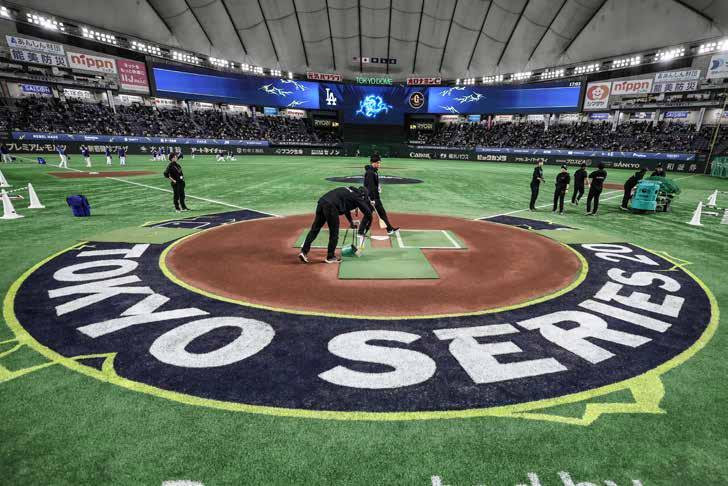
swing — and missed — in his second at-bat before grounding out to first base.
Finally, in the fifth inning, Ohtani did what everyone was expecting him to do. He drove a low fastball toward the right-field stands, its flight interrupted by a set of overzealous hands. While the play was initially ruled a home run, the video replay system was utilized to make sure the ball was on its way over the wall before it was touched.
The call stood.
“I thought it would clearly get in, but it
became a little iffy,” Ohtani said. “But I’m glad it got out.”
The home run transformed the crowd. The homer guaranteed fans they wouldn’t have to leave the stadium pretending they weren’t disappointed after spending hundreds, if not thousands, of dollars to watch Ohtani do something special. This made them more transparent about what they wanted.
So when Ohtani was intentionally walked in the seventh inning in an obvious intentional-walk situation, they booed. So when
Ohtani was walked again in the ninth inning, this time unintentionally, they booed again. The instant the Dodgers registered their third out in the top of the ninth, the Tokyo Dome turned into Dodger Stadium, with fans rushing for the exits.
When everything was over, Ohtani thanked the crowd for creating a special memory for him. In response, they screamed. They applauded. They were thanking him because he had already created memories for them.
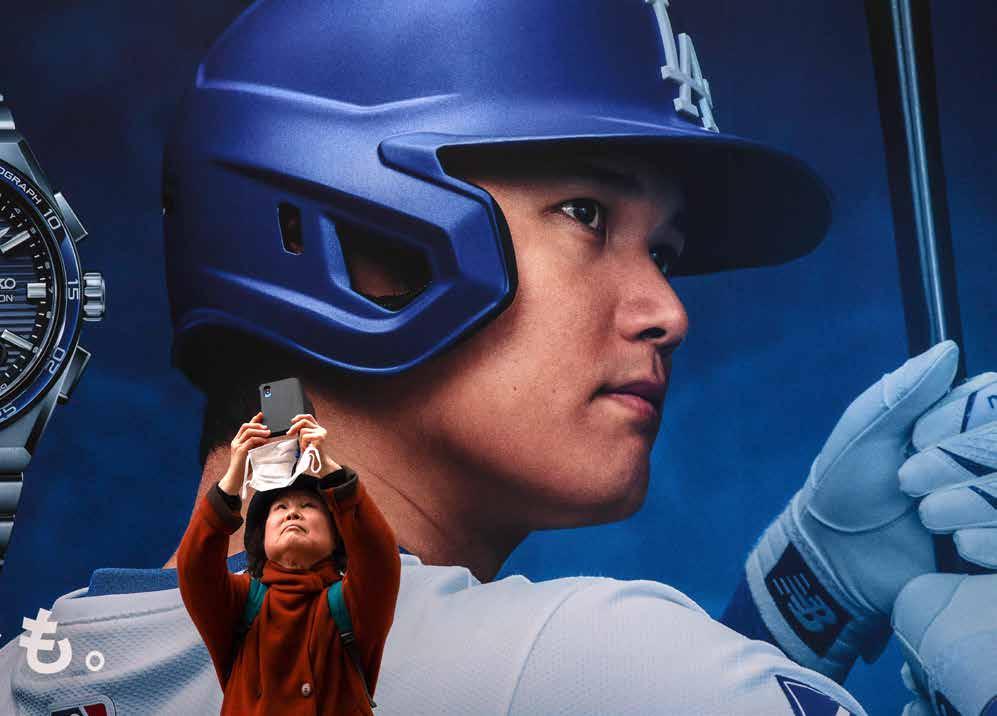
3,000 reasons Clayton Kershaw is greatest pitcher in Dodger history
BY BILL PLASCHKE • JULY 2, 2025
The slider was sizzling. The hitter was frozen. The strikeout was roaring.
With an 85-mph pitch on the black in the sixth inning against the Chicago White Sox on Wednesday at a rollicking Dodger Stadium, Clayton Kershaw struck out Vinny Capra looking to become the 20th player in baseball history to record 3,000 strikeouts.
As impressive as the pitch itself was the cementing of a truth that has taken nearly two decades to become evident.
Clayton Kershaw is the greatest pitcher in Dodgers history.
Greater than even the great Sandy Koufax. Gasp. Scream. Please.
This opinion appeared here three years ago and was swarmed with a barrage of emphatic and mostly emotional arguments for Koufax.
How dare you dis our Sandy! Koufax won more championships! Koufax never choked in the postseason! Koufax was more dominant!
All true, Koufax being a tremendous human being worthy of every syllable of praise. But as Wednesday so clearly proved in front of a history-thirsty crowd at Chavez Ravine, Kershaw has done something that any defense of Koufax cannot equal.
He’s endured. He’s taken the ball far more than Koufax while outlasting him in virtually every impact pitching category.
The Dodgers’ 5-4 victory Wednesday was the perfect illustration of the grinding that has lifted Kershaw to the Dodger heavens. He didn’t have his best stuff, he was battered by one of baseball’s worst teams for four runs on nine hits, but he fought through six innings to dramatically record his third strikeout and end his quest for 3,000 on his final hitter with his 100th pitch.
“I made it interesting, for sure,” Kershaw said afterward. “I made it take too long.”
When he took the mound at the start of the sixth, just one strikeout shy of 3,000, the crowd erupted in deafening screams previously only matched by a World Series win. When he breathtakingly struck out Capra — this was his last hitter regardless — he stalked off the mound and sighed and offered the thunderous crowd a sweaty wave.
“It’s a little bit harder when you’re actually trying to strike people out,” said Kershaw with a chuckle. “Running back out there in the sixth and hearing that crowd roar was up there for me, special moments … It was an amazing night.”
In all, it was pure Kershaw, and it has been unmatched even by his legendary predecessor.
Koufax was a meteor, streaking across the sky for the greatest five seasons of any pitcher in baseball history.
Kershaw, meanwhile, has become his own planet, looming above for 18 years with a permanent glow that is unmatched in Dodgers lore.
Koufax was an amazing flash. Kershaw has been an enduring flame.
Koufax was Shaq. Kershaw is Kobe.
When this was previously written, manager Dave Roberts waffled on the question of whether Kershaw was the greatest Dodger pitcher ever.
This time, not so much.
“Obviously, Sandy is Sandy,” he said Wednesday. “You’re talking about 18 years, though, and the career of the body of work. It’s hard to not say Clayton, you know, is the greatest Dodger of all time.”
When one talks about the GOAT of various sports, indeed, a key element is always longevity. Tom Brady played 23 seasons, LeBron James has played 22 seasons and Babe Ruth played 22 seasons.
One cannot ignore the fact that Kershaw, in his 18th season, has played six more seasons than Koufax while pitching 463 more regular-season innings. With his 3,000 strikeouts he has also fanned 604 more batters than Koufax, the equivalent of 22 more games composed solely of strikeouts, an unreal edge.
OPPOSITE: Clayton Kershaw takes less time throwing a pitch than it takes you to look at these four photos. This sequence also has some historical significance. It’s the pitch that Kershaw threw to Vinny Capra of the Chicago White Sox for what would be his 3,000th career shutout.
GINA FERAZZI / LOS ANGELES TIMES
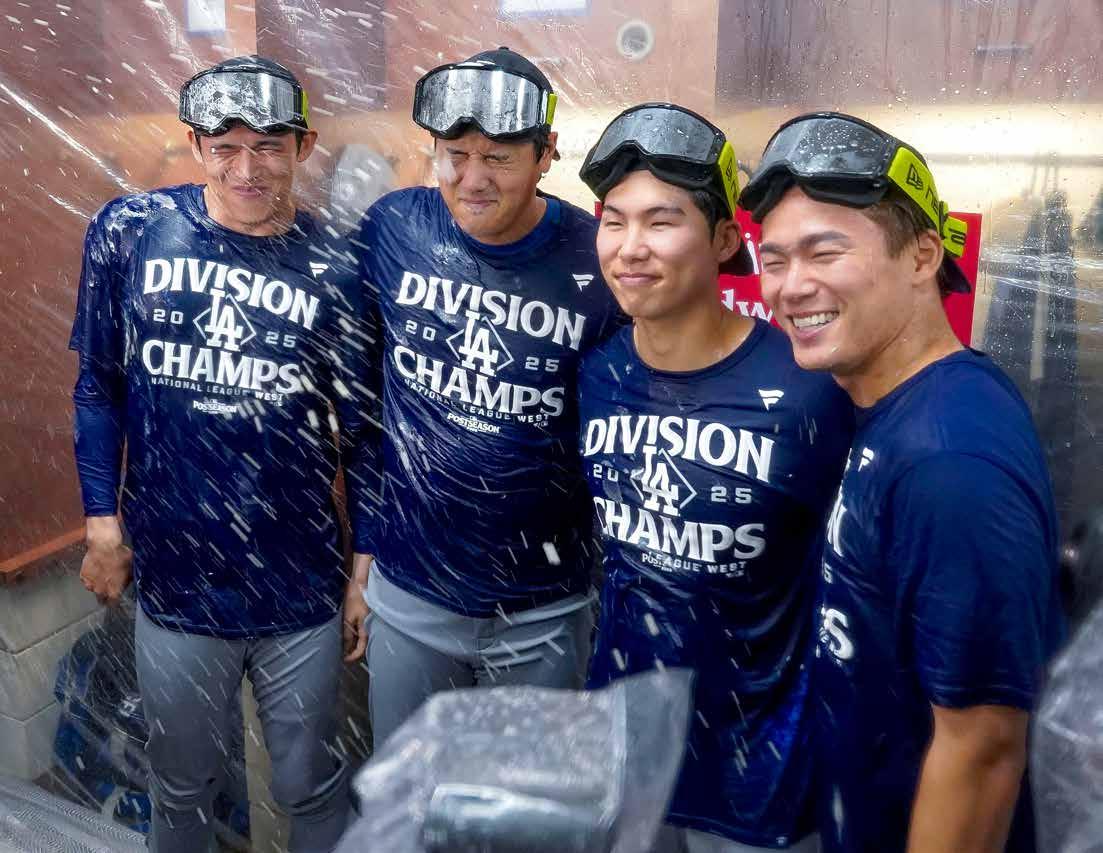
Dodgers clinch 12th NL West championship in 13 seasons
BY JACK HARRIS • SEPT. 25, 2025
PHOENIX — It was not supposed to be this difficult. It was not expected to feel so frustrating.
Six months ago, the question was not whether the Dodgers would win the National League West, but how far out of the water they’d blow the competition.
It wasn’t whether they’d enter October in position to defend their World Series title, but if they could set a single-season wins record along the way.
“Everyone,” first baseman Freddie Freeman recalled, “was talking about our “superteam.’”
What played out instead, of course, was a disappointing regular season relative to the club’s lofty preseason expectations.
The team will not win 100 games, let alone the 120 that some predicted ahead of the year. It will not have a bye for the first round of the playoffs, having limped through much of the second half of the schedule. It did not realize the full potential of its $400 million roster, hampered by starting pitching injuries early in the year, bullpen implosions down the stretch and an extended funk from the lineup in the middle of the summer. It did not play like the star-studded juggernaut or villainous evil empire or ascendant dynastic power the rest of the baseball world had
labeled it to be.
“This is not the route we envisioned,” Freeman said.
“It hasn’t been easy,” manager Dave Roberts added.
Now, however, none of that matters anymore.
Because as far as the regular season is concerned, the team checked the only box that matters.
With an 8-0 win over the Arizona Diamondbacks on Thursday at Chase Field, the Dodgers clinched their 12th division title in the last 13 years. They ensured that they will open the playoffs at home, even though it will start with a best-of-three wild-card round beginning next Tuesday. And most important, despite their struggles over the last couple months, they feel they are entering October playing the kind of baseball that had eluded them for much of the year, finally starting to feel like they are reaching their tantalizing ceiling.
“I do feel that in totality, we’re playing our best baseball of the season,” Roberts said.
“The win-loss hasn’t reflected it, but I think that’s what’s most important. There’s just been a lot of good things and a lot of growth from a lot of players, which has been fun to see.”
Fun is not a word that has often been associated with the Dodgers this season.
Early in the year, their best starters were hurt and many of their best hitters were struggling. They still built a nine-game lead in the division in early July, only to play 10 games under .500 for the next two months, allowing the San Diego Padres to get back in the division race.
“This year was harder than ever, to get to this point,” said third baseman Max Muncy, who missed extensive time himself with knee and oblique injuries. “We went through a lot. We had a lot of injuries. We had a lot of ups and downs.”
They will also begin October facing a litany of questions — none bigger than a bullpen that has been run down by a heavy workload and let down by the struggles of its most trusted veteran relievers.
But with Thursday’s division-clincher, they have won 12 of their last 17 games, and will enter the postseason riding some longmissing momentum.
“Even when it was our darkest, I just always saw our guys stay together and compete,” Roberts said.
“That’s what’s going to make us stronger during October,” echoed pitcher Blake Snell. “It’s what we needed.”
OPPOSITE: Nothing like a little bubbly after a big win, although in a glass is preferred over sprayed at you indiscriminately. The recipients in this case, from left, are Roki Sasaki, Shohei Ohtani, Hyeseong Kim and Yoshinobu Yamamoto. The reason for the celebration is the Dodgers winning the National League West for the 12th time in 13 seasons. DARRYL WEBB / ASSOCIATED PRESS
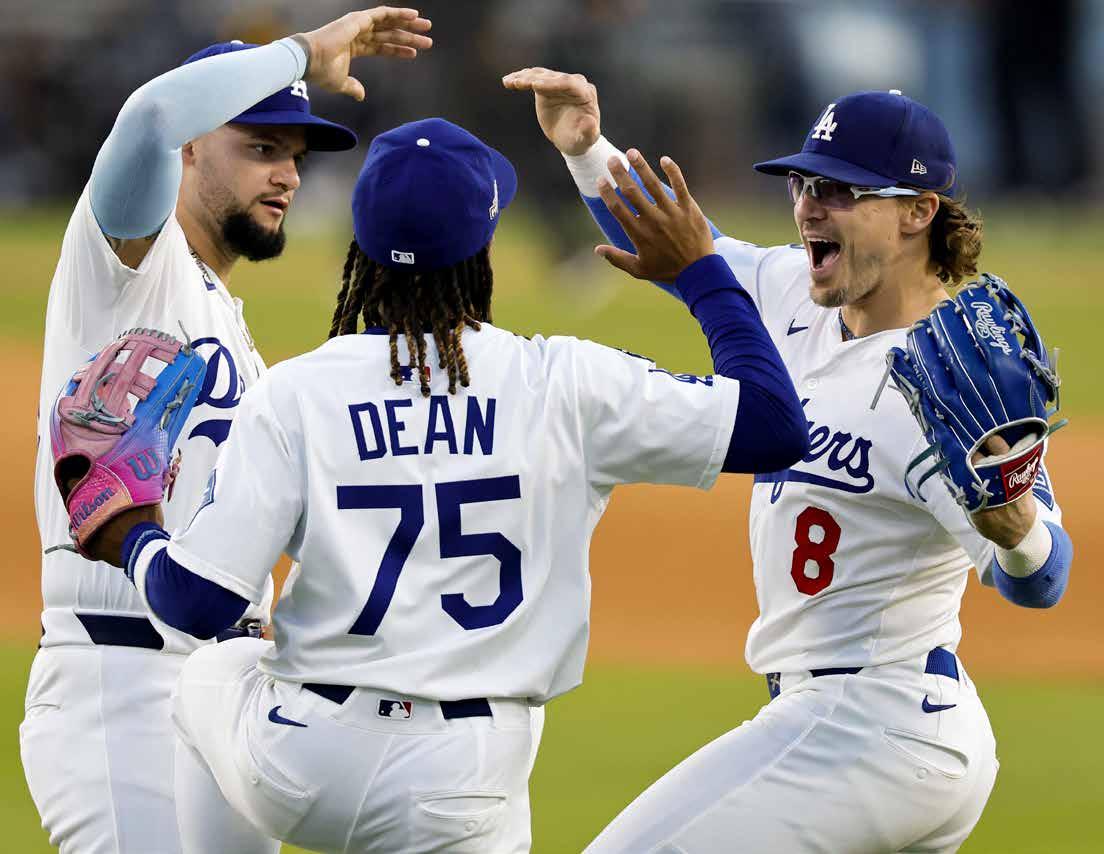
Are these Dodgers best postseason team in baseball history? Might be
BY BILL PLASCHKE • OCT. 16, 2025
The Milwaukee Brewers have no chance. Neither will the Seattle Mariners or the Toronto Blue Jays.
The clear truth emerged from the Dodger Stadium shadows late Thursday amid a downtown-shaking roar of delight and disbelief.
This is ridiculous. This is simply ridiculous, how well the Dodgers are playing, how close the history books are beckoning, and how an ordinary summer has been followed with unbelievable days of the extraordinary.
The Dodgers are not going to lose another game this October. Write it down, bet it up, no major league baseball team has ever played this well in the postseason, ever, ever, ever.
With their 3-1 victory over the Brewers on Thursday in Game 3 of the National League Championship Series, the Dodgers take a three-games-to-none lead with a sweep likely in the next 24 hours and coronation coming in the next two weeks.
The Dodgers are going to win this NLCS and follow it with a four-game whitewash of the World Series because, well, you tell me. How is anybody going to beat them?
Match their aces-flush rotation? Nope. Equal their hot closer and revived bullpen? Sorry. Better than their deep lineup? Nobody is even close.
The Dodgers are more than halfway to finishing the most dominant postseason in baseball history. It’s all there in the numbers.
The only team to go undefeated through the playoffs since the divisional era began was the 1976 Cincinnati Reds. But the Big Red Machine had to win only seven games. Since the playoffs were expanded and the test became tougher, the greatest October streaks have belonged to the 2005 Chicago White Sox and the 1999 New York Yankees, both of whom went 11-1.
These Dodgers were forced into that early wild-card series, so if they end this postseason without another loss, they will finish 13-1.
The last team in this town to have such a dominating postseason was the champion 2001 Lakers, who went 15-1 in the postseason with only one stumble against Philadelphia on the night Allen Iverson famously stepped over Tyronn Lue.
Fittingly, the mamba mentality of that group was referenced Thursday by Mookie Betts.
“Honestly, I have zero emotions,” he said. “We’re up but, you know, like Kobe said, the job’s not done, so we’ve got to keep going and just keep applying pressure.”
Those Lakers were legendary. These Dodgers will be soon.
“That team is pretty good,” acknowledged Brewers manager Pat Murphy. You think? They are currently 8-1 in the playoffs and have won 23 of their previous 29 games and again, who’s going to beat them?
Start with that rotation. Tyler Glasnow followed gems by Blake Snell and Yoshinobu Yamamoto on Thursday by twirling 5 ⅔ innings of swing and miss, holding the Brewers to one run with eight strikeouts. In three games, the Brewers have scored two runs in 22 ⅔ innings against Dodgers starters.
And perhaps their best pitcher hasn’t even taken the mound yet, that being Friday’s starter, Shohei Ohtani.
Now for their deep lineup. Ohtani is still mired in a career-worst slump, but his one hit Thursday was a leadoff triple that led to him scoring the first run, and seemingly everybody else chipped in. Betts had the first RBI, Tommy Edman knocked in Will Smith with the go-ahead run in the sixth, a hustling Freddie Freeman scored on a wild pickoff attempt, and on and on …
Finish with their bullpen, which is actually finishing. Taking over for Glasnow with a runner on first and two out in the sixth Thursday, Alex Vesia, Blake Treinen, Anthony Banda and Roki Sasaki shut the Brewers down the rest of the way, and their
OPPOSITE: The rules are that you can still celebrate even if you didn’t contribute much. This trio of Andy Pages, left. Justin Dean and Kiké Hernández were collectively one-for-six in Game 3 of the National League Championship Series against the Milwaukee Brewers. This moment came after the Dodgers went up three games to none. GINA FERAZZI / LOS ANGELES TIMES
